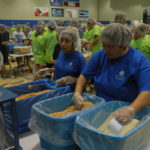WACO—U.S. Secretary of Agriculture Sonny Perdue announced a major expansion of Meals-to-You, a partnership between the USDA, the Baylor University Collaborative on Hunger and Poverty, McLane Global and PepsiCo, to feed low-income children in rural areas.
The initiative will serve nearly 5 million meals per week to rural children impacted by COVID-19-related school closures—five times its original goal.

“We are grateful to be a part of an innovative team made up of both the public and private sectors motivated by the strong desire to help our neighbors in need,” said Jeremy Everett, executive director of the Baylor University Collaborative on Hunger and Poverty. “We hope that the boxes of food will nourish children and communicate to their families that they are not in this tough circumstance alone.”
Initially, Meals-to-You aimed to deliver about 1 million meals per week to students eligible for free and reduced-price meals in a limited number of rural schools closed due to COVID-19, but that goal has been quickly surpassed.
Meals-to-You already has shipped nearly 3.5 million meals to the homes of children in 12 states—Alabama, Alaska, Arkansas, Kansas, Louisiana, Maine, Mississippi, Missouri, Oklahoma, Tennessee, Texas and Virginia.
In the last few weeks, 23 additional states and Puerto Rico have asked to participate in Meals-to-You, so the partnership is now quickly ramping up to serve 5 million meals per week to help meet growing demand.
Thirteen of those states are approved and have families either enrolling or in the final stages of verification, while 10 additional states have recently started the application process.
The Baylor Collaborative on Hunger and Poverty continues to work closely with states interested in the initiative and can now add more states to the program to meet continued demand.
Baylor researchers to study impact
In addition, the Meals-to-You expansion will include a research component led by Baylor researchers, who will study family’s responses to the COVID-19 crisis and the potential impact of Meals-to-You.
Sign up for our weekly edition and get all our headlines in your inbox on Thursdays
“With this award, Baylor University is advancing research that sheds light on the economic implications of the coronavirus outbreak,” said Kathy Krey, director of research and administration of the Baylor Collaborative on Hunger and Poverty. “We are evaluating the challenges and successes of the Meals-to-You program and how it impacts family’s food security.”
Meals-to-You boxes contain 20 nutritious meals—10 breakfasts and 10 lunches—to cover the meals children would normally receive at school over two school weeks. Foods contained in the boxes meet USDA’s Summer Food Service Program meal standards and may include items like milk, fruit cups, cereal, whole-grain crackers and chili. Boxes are delivered directly to children’s doorsteps via the U.S. Postal Service and other delivery services.
USDA is hearing directly from families about how much this program means to them.
“I just wanted to say ‘An Unmeasurable Amount of Thank You’s’ are being sent to you and the entire teams it took to coordinate, prepare, and distribute these meals across my community,” a mother from rural Texas said.
“I sincerely appreciate the incredible amount of effort it took for this to happen and I’m indebted to you and your teams! Thank you for making a difference in my household without even knowing who I am (we’re a family of 5 with one parent working with reduced wages).”
Need for ‘big picture ideas’
Perdue noted “uncertain and difficult times call for unprecedented actions and big picture ideas.”
“Rural children affected by school closures faced food insecurity, but these great American groups and companies stepped up to help their fellow countrymen by delivering boxes of food across the country,” he said.
Denton McLane, chair of McLane Global, called the program “a lifeline to thousands of students across rural America that would otherwise go hungry during this challenging period.”
“We’ve shifted to a 24-hour production schedule across all locations to meet the demand, and couldn’t be prouder of our partners, employees and the people on the ground working to ensure these meals get to those who need it most,” he said.
Matt Smith, senior director of Food for Good at PepsiCo, expressed his organization’s desire to work with the USDA and Baylor to deliver meals to students “who need them now more than ever.”
“Since 2009, we’ve been operating a U.S. nutrition program within PepsiCo called Food for Good that has delivered more than 30 million nutritious meals to children through afterschool and summer programs. In this time when millions of children are affected by school closures, it is a privilege to bring our scale and experience to this innovative partnership to serve our neighbors in need nationwide,” Smith said.
USDA’s Food and Nutrition Service continues to provide additional options and flexibilities to feed children during the COVID-19 outbreak. Some examples include:
- Issuing 21 nationwide waivers for child nutrition programs to allow for innovative methods of meal service and distribution during this unprecedented crisis pandemic;
- Launching the Meals 4 Kids site finder in both English and Spanish to help families across America find free meals for kids during the public health emergency; and
- Approving Pandemic-EBT in 19 states, which provides food assistance to families of children eligible for free or reduced-price meals dealing with school closures.














We seek to connect God’s story and God’s people around the world. To learn more about God’s story, click here.
Send comments and feedback to Eric Black, our editor. For comments to be published, please specify “letter to the editor.” Maximum length for publication is 300 words.